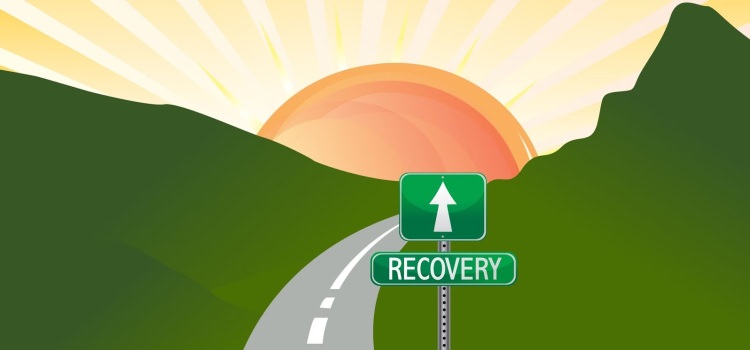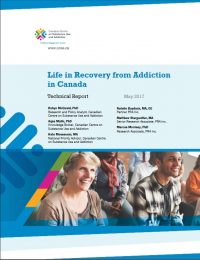Life in Recovery from Addiction in Canada

Without sobriety, I have zero quality of life. I became a liability to society. I now love myself and have compassion for others. I’m honest and dependable. I respect myself and am respected. I am a professional and love what I do for a living. I am loved by those closest to me. I trust myself.
From the Life in Recovery Report
By Rand T.
Regina, Saskatchewan
People with active addictions have been marginalized and stigmatized for years and this has, for the most part, prevented them from actively celebrating their recovery, and there are millions of us in Canada (likely in the 5 million plus range). Most people are reluctant to talk about it. In recovery we privately celebrate each other’s successes, birthdays, anniversaries but these are not generally shared with the outside world.
The lack of attention on recovery from addiction has been changing for the better. Faces and Voices of Recovery Movements in the United States and Canada have started to bring more attention to honoring people who have moved from addiction into recovery. The documentary Anonymous People has also been instrumental in raising people’s awareness of the idea that recovery matters. It is interesting that, for the most part, the attention to these movements have been almost exclusively within the recovery community and not within our broader community.
Faces and Voices of Recovery Canada was able to convince the Canadian Centre on Substance Use and Addiction to begin to research the state and nature of recovery in Canada. This resulted in a summit bringing together individuals from across Canada representing recovery, treatment, continuing care, education, research and government to create a united vision for what recovery means in Canada. From that summit a group titled the National Recovery Advisory Committee embarked on a mission to try to evaluate what recovery looks like in this great country. We asked, and got almost 900 answers from a wide variety of people across the country.
It is important because it points out what is really important about recovery and that is that people get better and because they get better they start to contribute more to the rest of society. They also start to get better about who they are, that matters more. Recovery means we get back to our true selves. That is worth celebrating.
The survey findings were very interesting. As the resulting report, Life in Recovery from Addiction in Canada, puts it:
This survey provides a wealth of information about the experiences of individuals in recovery in Canada. For example, participants used on average six of 17 different recovery programs, as well as a number of informal supports during their recovery journey, supporting the view that recovery is unique to the individual and includes many different pathways.
The median age of first use was 13.5 years confirming that this is a pediatric onset disease and the majority of respondents felt they met criteria for addiction in their early 20’s. It is a disease that starts young and develops quickly. It is also a disease that works hard to convince us that it isn’t there.
The really interesting findings were what gets better. Employment, income, emotional health, physical health, family relationships, in short everything. Another interesting stat was the reason for initiating recovery, 69% indicated that quality of life reasons were primary for starting the recovery process and 83% said that was the reason for staying in recovery. Life gets better.
“Recovery capital” is the collection of resources and strengths your recovery has given you. Check yours; see what you have; and don’t be afraid to share with others what your recovery has done for you. There has been some controversy about breaking anonymity. That is not what this is about. This isn’t talking about what program you are in this is about talking about what is better because of choosing to be free from drugs, including alcohol. People know that cancer can be beaten because people talk about it and we then search for a cure for the disease. Let’s do some more talking about addiction and recovery.
What follows is an excellent summary of the Life in Recovery from Addiction in Canada report.
By Bill White
Originally posted on May 26, 2017 on The William White Papers
A 2015 review of Life in Recovery surveys in the United States, the United Kingdom, and Australia highlighted 20 conclusions of these surveys and related epidemiologic studies on remission from substance use disorders. The profiled studies confirm substantial recovery prevalence within the general populations, the diversity of people in recovery, the diversity of pathways of recovery initiation and maintenance, and the substantial improvements in health and quality of life that accrue with time in recovery.
The Canadian Centre on Substance Abuse has just released Life in Recovery from Addiction in Canada, confirming and amplifying many of the findings from the earlier studies. Here are a few highlights from this report.
Self-identified Canadians in Recovery report substantial past problem severity, with more than 70% having experienced each of six major diagnostic criteria for addiction.
Most began substance use by their mid-teens and reported onset of addiction between the ages of 15-25. The most frequently reported primary drug choices in order of prevalence were alcohol, cocaine, cannabis, heroin, prescription opioids, and methamphetamine.
Most (52.4%) Canadians in recovery define recovery in terms of abstinence (with a minority of less than 1% reporting controlled use) combined with enhancement of global health and functioning.
Canadians in addiction recovery report substantial gains in health, quality of life, and social functioning.
- 70.6% report overall quality of life as excellent, very good, or good.
- 80.0% report their physical health as excellent, very good, or good.
- In comparing addiction time to recovery time:
- regular exercise increased from 16.5% to 68.7%
- regular medical checkups increased from 33.7% to 82.8%
- healthy eating habits increased from 14.5% to 82.1%
- use of tobacco products decreased from 80.1% to 34.2%
- 84.3% report their mental health as excellent, very good, or good.
- 78.9% of Canadians in recovery are employed, 11.3% are retired or semi-retired, and 6.5% are students.
- Comparing addiction time to recovery time, reported arrests dropped from 42.3% to 2.3%; jail or prison time dropped from 13.9% to 1.4%; and driving under the influence dropped from 80.2% to 3.5%.
Canadians in recovery report substantial shifts in family and community involvement in comparing time in addiction and time in recovery.
- Participation in family activities increased from 31% to 90.3%
- Rates of reported family violence and lost custody of children all dropped precipitously following recovery initiation.
- Volunteering with a community or civic group increased from 14.4% to 66.8%
- Rates of paying bills, paying current and back taxes, all substantially increased after recovery initiation.
Canadians in recovery report using a wide variety of resources to help initiate and maintain their recovery, including 12-Step mutual support groups, professionally-directed addiction treatment, psychiatric or psychological therapy, recovery housing, non-12 Step mutual support groups, and medication-assisted treatment. More than 50% of respondents also reported using such supports as family and friends, religious or meditative practices, reading recovery literature, pets, exercise, nutrition, recovery websites or social media, and cultural values and traditions.
A significant portion of Canadians in recovery report current use of a prescription drug to treat a co-occurring physical (37.2%) or mental (35.2%) condition, but only 1.8% report current use of a medication for the management of addiction. 20.2% of survey respondents report having used medication-assisted treatment to help initiate their recovery.
More than half (51.2%) of Canadians in recovery report no subsequent experience of relapse following recovery initiation.
More than half (53.4%) of Canadians in recovery report more than five years of time in recovery, with 20.7% reporting more than 20 years in recovery from addiction.
The Life in Recovery from Addiction in Canada report is the latest investigation confirming the possibility of sustained recovery from addiction through a diversity of recovery pathways. It affirms the value of communities creating the physical, psychological, and social space within which personal/family recovery from addictions can flourish.
Once again, the full report is available here: Life in Recovery from Addiction in Canada.
Rand T. is a person in long-term recovery, having been free from alcohol and other drugs since March 26, 1972. That freedom “from” has given him the freedom “to” do a lot of other things. Those include staying married to the same person, being a dad, a grandfather, a neighbor, a friend, and a teacher. Recovery has also given him the energy to expand much of his work into helping others affected by substance abuse. He is a Canadian Certified Addiction Counselor and an Internationally Certified Prevention Specialist in drug and alcohol concerns (kids call him the Drug Teacher). He is very grateful that he has been able to do as much work as he has in the field of substance abuse.
Rand was one of the people asked to participate in developing a national framework to both understand and promote the idea of recovery. He became a member of the National Recovery Advisory Council, funded by the Canadian Centre on Substance Use and Addiction (CCSA). The opportunity to hear from people all across the country about what recovery meant to them was fascinating to Rand. And he is very pleased to provide us with the above introduction and summary of the resulting CCSA report, Life in Recovery from Addiction in Canada.
 Bill White has a Master’s degree in Addiction Studies and has worked full time in the addictions field since 1969 as a streetworker, counselor, clinical director, researcher and well-traveled trainer and consultant. He has authored or co-authored more than 400 articles, monographs, research reports and book chapters and 20 books.
Bill White has a Master’s degree in Addiction Studies and has worked full time in the addictions field since 1969 as a streetworker, counselor, clinical director, researcher and well-traveled trainer and consultant. He has authored or co-authored more than 400 articles, monographs, research reports and book chapters and 20 books.
His book, Slaying the Dragon – The History of Addiction Treatment and Recovery in America, received the McGovern Family Foundation Award for the best book on addiction recovery.
He has recently published a memoir, Recovery Rising: A Retrospective of Addiction Treatment and Recovery Advocacy.
Bill’s website, Selected Papers of William L. White, “contains the full text of more than 300 articles, 8 monographs, 30+ recovery tools, 9 book chapters, 3 books, and links to an additional 17 books written by William White and co-authors over the past four decades as well as more than 100 interviews with addiction treatment and recovery leaders.”
The site is well worth a visit and you can do that by clicking here: The William White Papers.


























Thanks Roger for providing this information about the survey entitled “Life in Recovery from Addiction in Canada.” It’s my strong opinion that we need more information spread about the success of recovery efforts in which individual lives, families and society at large are immeasurably enhanced as a direct result of people achieving recovery from addition to alcohol and other drugs.
A couple of excellent articles. However, looking at:
“More than half (51.2%) of Canadians in recovery report no subsequent experience of relapse following recovery initiation.
More than half (53.4%) of Canadians in recovery report more than five years of time in recovery, with 20.7% reporting more than 20 years in recovery from addiction.”
– there are some numbers conspicuously absent, namely on people who relapsed, but didn’t make it back to be part of the positive statistics, and people who showed up at a recovery program and didn’t even get started on recovery, but at least showed up, showing an initial desire for recovery, but finding it too hard to get it going.
anyway thanks.
Thanks, Rand, for writing this important article. This is the missing information policy makers and politicians need to lead them towards a more rational approach to managing the current opioid epidemic. There are many pathways out of the disease, people with addiction involving all addictive drugs (including alcohol and opioids) can and do successfully recover. And those people go on to contribute to their communities, to pay taxes and to vote. Good work Rand, good work AA Agnostica. Ray B MD
“Comparing addiction time to recovery time… driving under the influence dropped from 80.2% to 3.5%”
Really? Continuation of DUI is considered “recovery time”???
In the invitation to potential on-line respondents, the question was worded: “Are you in recovery from addiction to alcohol or other drugs? For the purpose of this survey, being “in recovery” means that in the past you had an addiction to alcohol or other drugs, but now that addiction is no longer active”. So the respondents self identified. They are later stratified based upon things like gender, drugs of choice and meeting specific diagnostic criteria for addiction (ICD10).
You are addressing one of the fundamental problems making research in this area so difficult, the lack of consensus on a universal definition of recovery. One of the goals of the survey was to elicit respondents’ definitions of ‘recovery’. Even in the rooms of AA I suspect there is disagreement on this.
It is always a good way to start an argument in an AA meeting: open the topic of “always an alcoholic”, “recovering”, “recovered”…you can add to the list. Most groups will polarize on this very strongly.
I wondered that, myself. Apparently, relapse is a part of recovery time. If you look at the other stats you will see this seems to be true for the study. “More than half (51.2%) of Canadians in recovery report no subsequent experience of relapse following recovery initiation.” Nonetheless, it’s a dramatic drop in DUIs. I’d sooner question the 51.2% success rate. I guess success can be measured many ways. I note this rate is what is reported by alcoholics in the study. Observed abstinence under controlled conditions is impossible.
Dale, I think the 51.2% success rate – looks like that’s people who are in recovery who never had any intermediate relapses, while presumably 48 whatever are in recovery but had relapses. that adds up to that 100% of those who are sober, are sober. In other words half of those sober had relapses, half didn’t. It doesn’t say anything about all those who are not sober, and didn’t make it, it is an entirely different kind of number than the 5-10% success rate of AA, which includes all those who did not make it. And it seems to me that we really ought to focus our attention and effort on those who did not make it, which we here on AAagnostica do quite a bit, in the sense that we’re thinking of those who got disgusted with AA because they aren’t religious, but there is a much greater number who didn’t make it simply because god or no god, AA basically doesn’t make sense. It takes a particular sort of person to put up with, and benefit from AA.
While these articles are good, and it is great to see actual numbers on how much people’s lives improve with recovery, that is all these articles address – which is fine – but we do also need more focus on those who don’t make it.